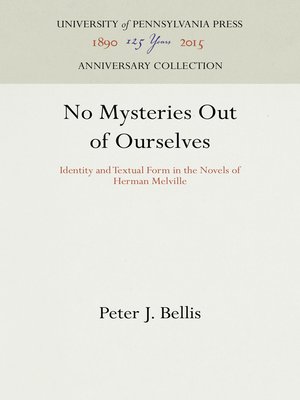No Mysteries Out of Ourselves
ebook ∣ Identity and Textual Form in the Novels of Herman Melville · Anniversary Collection
By Peter J. Bellis

Sign up to save your library
With an OverDrive account, you can save your favorite libraries for at-a-glance information about availability. Find out more about OverDrive accounts.
Find this title in Libby, the library reading app by OverDrive.



Search for a digital library with this title
Title found at these libraries:
| Library Name | Distance |
|---|---|
| Loading... |
In this book Peter J. Bellis aims to show how Melville's career is shaped by his desire to define and represent the self, to find a secure identity on which to base personal and social relations. Using Typee, Pierre, White-Jacket, Redburn, Billy Budd, and Moby-Dick as models, Bellis isolates three forms of selfhood—the integrity of the physical body, the son's genealogical link to his father, and the coherence of an autobiographical text—that Melville explores throughout his work. He shows how, as Melville texts each of these, his work becomes increasingly self-reflexive and self-critical; his search for an absolute ground for both self and text ends by undermining the very authority it would establish. In this Melville differed markedly from Whitman and Thoreau, who did find or create identities for themselves in their writing.
Bellis examines Melville's last novel, The Confidence-Man, to show his method as ultimately deconstructive—culminating, in fact, in the abandonment of Melville's own career as a novelist.







